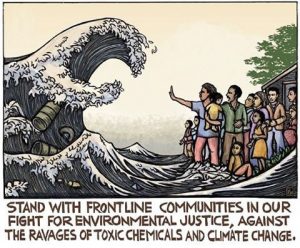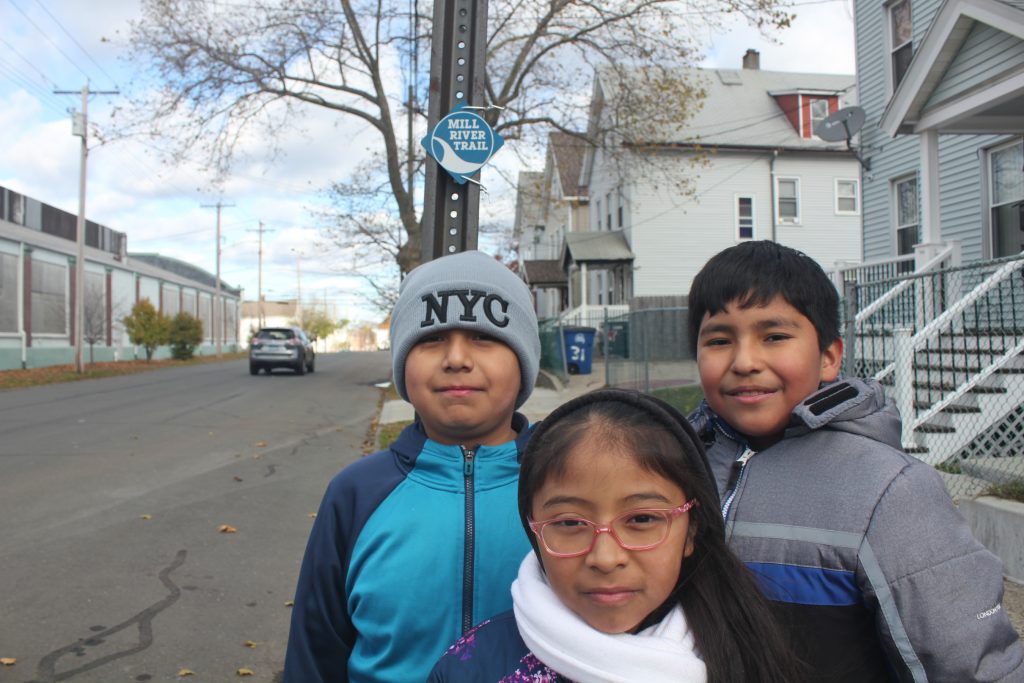
All Americans have the right to live in healthy communities, yet neighborhoods home to people of color and/or working class residents are disproportionately subjected to serious pollution and environmentally destructive activities. Save the Sound works hard to counteract this discrimination—scroll down for some current projects.
Environmental justice is the intersection between the fights for civil rights and for environmental health, ensuring marginalized communities have self-determination and don’t become repositories for activity that harms both the environment and public health.
Legal action is often a necessary complement to grassroots action to stop projects that will expose citizens to unhealthy levels of pollution on the basis of their race, religion, or economic status. This is a national problem, and our region is no exception. With much of its wealth concentrated in suburban communities, our region’s urban and rural neighborhoods are routinely faced with pollution and public health threats. For decades, Save the Sound has successfully fought off the intrusion of polluters into marginalized communities, and we work to be sure these communities share the benefits of green restoration, of effective wastewater infrastructure, and of the clean energy economy.
Everyone deserves clean water, healthy air, and protection from climate change!

Explore some of our current work in overburdened communities:
- Olin Powder Farm: We are collaborating with community leaders, an inter-religious/inter-racial faith-based social justice organization and the Hamden Land Conservation Trust in a campaign to transform a 102-acre property in the predominately-Black neighborhood of Newhall from a contaminated site into a nature park.
- Mount Vernon Boys and Girls Club: Our water quality team has documented substantial chronic raw sewage overflows running into the Hutchinson River from Mount Vernon, a lower income, majority-Black town in Westchester County. Despite EPA enforcement action (which our investigation instigated), the pollution continues. This year, our team is partnering with the local Boys & Girls Club to empower them to monitor and document water pollution in their hometown waterway and push local leaders for the clean water that is everyone’s right.
- Shared Solar: With four out of five Connecticut residents unable to benefit from rooftop solar, we are working to bring solar energy to all—including renters. This includes a low- to moderate-income carve-out to ensure no community is left out of the clean energy revolution.
- Energy Affordability: Save the Sound is participating with other stakeholders in Connecticut’s regulatory process designed to identify barriers and solutions to create a future where all residents are able to afford the clean energy they need.
- Mill River: We’re in the midst of new work on the Mill River Trail that will replace an abandoned segment of road with a green infrastructure park. Not only will this project filter stormwater and absorb flood waters, it will serve as a living classroom for nearby schools and improve access to the Mill River and the New Haven Parks system for the diverse and historically marginalized community of Fair Haven.
- Wheeler St: Not far from there, we’re engaged in a fight to protect The Annex, perhaps the most environmentally overburdened neighborhood in all of Connecticut, from dramatic expansion of a transfer station that would increase smells and vermin and threaten the Quinnipiac River with more polluted runoff.
- Stormwater and Resilience: Over the past decade, Save the Sound has focused our green infrastructure work within Bridgeport and New Haven, pioneering the design, siting, and installation of new practices in these racially and economically diverse cities, including nearly 100 bioswales. This work continues to expand as we install edible and traditional rain gardens that provide low- and moderate-income neighborhoods more greenery and shade, lower summer temperatures, and reduce polluted stormwater and sewage overflows.
Explore our current legal actions on air and climate, land use, and water pollution.
Check our legal victories over the years here.
Save the Sound is committed to justice in environmental action, and our team is constantly looking for ways to ensure both our internal operations and our programming support a diverse and equitable world. To learn more about our diversity, equity, and inclusion work, please visit our presidents’ blog post discussing recent action.
